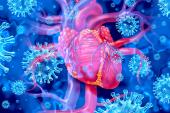Myocarditis After COVID-19 Vaccine: Data ‘Reassure’ More and More
“This is a very infrequent complication, and . . . overall it’s quite mild and not severe,” James Hermiller Jr told a TCT audience.

ORLANDO, FL—The occurrence of acute myocarditis after receipt of an mRNA-based COVID-19 vaccine is reassuringly rare, according to a review of recent studies provided to attendees of TCT 2021.
An expert panel, discussing the data today, concluded not only that the findings are strikingly consistent, but also that they might ultimately help point to new lines of investigation that could mitigate the problem even further.
Israel, which rapidly rolled out the Pfizer/BioNTech vaccine to its population once it became available, first said it was looking into the issue in April, with US and European agencies following suit shortly thereafter. Since then, studies have largely affirmed a greater risk of myocarditis in recipients of the mRNA vaccines, including the one from Moderna, with cases clustered in young males and typically associated with mild clinical courses.
At the TCT meeting, Ran Kornowski, MD (Rabin Medical Center, Beilinson Hospital, Petah Tikva, Israel), noted that Israel is in a unique position to study the link between COVID-19 vaccination and rare complications like myocarditis because a substantial proportion of the population has already received three Pfizer/BioNTech shots and it has a public health system that provides robust data from electronic medical records.
Kornowski’s group has published a series of studies addressing the myocarditis issue, and his colleague, Guy Witberg, MD (Rabin Medical Center), provided a review of the research to a TCT audience today. He started by highlighting the effectiveness of the vaccines and their role in helping to combat the COVID-19.
“However, in spite of these very good results, there are lingering concerns over the safety of the mRNA vaccines, mainly due to the rapid approval process they underwent with [the US Food and Drug Administration], and a lot of media attention has been given to reports of various adverse events, which has resulted in vaccine hesitancy,” Witberg said.
But research shows that myocarditis is a rare complication of vaccination. In August, the Israeli researchers published data in the New England Journal of Medicine demonstrating that even though the risk of myocarditis was increased after receipt of the Pfizer/BioNTech shot, the magnitude of the risk was even greater among patients infected with SARS-CoV-2. Of the cardiovascular adverse events, vaccination was associated only with myocarditis, whereas COVID-19 itself was also linked to others, including pericarditis, pulmonary embolism, arrhythmia, deep vein thrombosis, and myocardial infarction.
The group subsequently set out to study the incidence, severity, and clinical impact of vaccine-associated myocarditis using data from Clalit Health Services, the largest healthcare organization in Israel, reporting their results in NEJM early last month. They identified 54 suspected cases of myocarditis after vaccination, most of which were mild in severity, meaning there were only nonsevere symptoms and no evidence of LV dysfunction. There was only one fulminant case—a patient who presented in cardiogenic shock and had severe LV dysfunction.
Overall, incidence was 2.13 per 100,000 vaccinated people, with higher rates in men versus women and in those younger than 30; the highest incidence was seen in males ages 16 to 29 (10.69 per 100,000).
In terms of the consequences, echocardiography showed that nearly 80% of patients with myocarditis had normal LV function at discharge, “which is very reassuring if we remember that probably the most important prognostic factor following acute myocarditis is the degree of LV dysfunction,” Witberg said. And through a median follow-up of 81 days, only one patient—an 81-year-old with preexisting cardiac disease—died and one was rehospitalized for a condition other than myocarditis. All other patients remained asymptomatic.
Thus, myocarditis after mRNA vaccination is “very rare,” is generally mild, and appears to be associated with a favorable longer-term prognosis, Witberg concluded, noting that two other analyses using different methods yielded similar results. “I think the overall data is consistent regarding the major features of vaccine-associated myocarditis,” he said, “and we need to know and we need to relay [it] to our patients to make informed decisions about vaccination.”
Data Provides Reassurance of Vaccine Safety
During a panel discussion following Witberg’s overview, Elazer Edelman, MD, PhD (Brigham and Women’s Hospital, Boston, MA), said “we need to realize that COVID itself has myocarditis, viral infections have myocarditis, COVID vaccinations have rare myocarditis, as do vaccinations throughout history, and I’m reassured by the data.” And he suggested that this rare complication may present an opportunity to better study the processes underlying viral pericarditis more broadly.
He also addressed a question about whether there might be a lot more subclinical cases that aren’t being picked up. “In general, I would say clinically we don’t have the opportunity to see a lot of patients who are subclinical suddenly present with cardiac arrest and who are found to have just diffuse [late gadolinium enhancement] consistent with myocarditis,” Jaffer said. “I think we usually see the decompensations with the acute presentations.”
Also taking a positive view of the data was James Hermiller Jr, MD (Ascension, Indianapolis, IN). “Clearly, we as human beings . . . have this aversion to giving up what we have, and as such, I think many of these people with hesitancy, they think where they are without the vaccine is much better than it is and then they discount the benefits and emphasize the risk,” he said, adding that these analyses help put the issue to rest. “This is a very infrequent complication and . . . overall it’s quite mild and not severe.”
He noted that it will be interesting to track the potential for myocarditis in younger age groups as vaccines are rolled out to US children in the coming months, and Kornowski said his group plans to dig into that issue as well as what happens among people who have received a third, booster shot of the Pfizer/BioNTech vaccine.
Jaffer raised a couple of other areas that might be explored, too—the possibility that testosterone levels might be involved in the clustering of cases in young males, suggesting that children should be vaccinated at younger ages, as well as the potential use of adjunctive pharmacotherapy like beta-blockers during vaccination to prevent myocarditis in patients with a previous history of the condition.
Witberg pointed out that longer-term follow-up of patients who develop vaccine-associated myocarditis is a focus of ongoing research, noting that recent data from the US Centers for Disease Control and Prevention have been reassuring in regards to LV function. “So I think that . . . the more we follow-up on these patients we’ll probably be more and more reassured about the long-term prognosis,” he said.
Todd Neale is the Associate News Editor for TCTMD and a Senior Medical Journalist. He got his start in journalism at …
Read Full BioSources
Witberg G. Myocarditis after COVID-19 vaccination: what clinicians need to know. Presented at: TCT 2021. Orlando, FL. November 4, 2021.
Disclosures
- Witberg reports no relevant conflicts of interest.





Comments